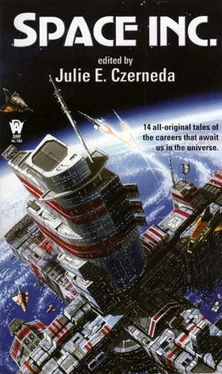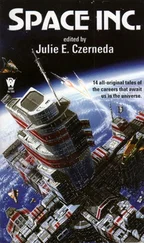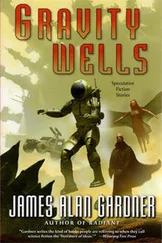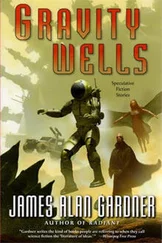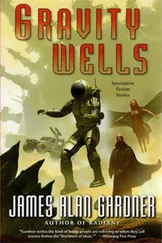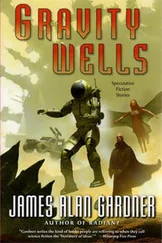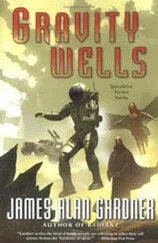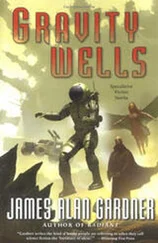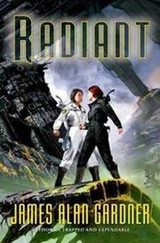Personally, I regard our tenancy in space as entirely too precarious to think of colonization. But if the World Court rules the children have to be transferred Earthside, someone’s going to have to enforce the order. I can see the whole mess being recast as a child-health issue and dumped hot and quivering in the IMS’ jurisdiction. And that is something I want to see coming.
No verdict so far, and so to work.
I see no reason to transfer the patient from Sharman; indeed, knowing about the IBDD shuttle, I prefer to keep what grace we had for accidents and true emergencies. Hence at 2030, I’ve done rounds and am configuring the operating station Y and I both favor to my own preferences, fitting the headset, loading the VR interface, and adjusting the surgical gloves. For a small man, Ygeveny has big hands.
I study Keene’s anatomical reconstructions and lab results. He has a hot gallbladder, all right, taut and inflamed, with an impacted stone in the bladder neck. With the surgical expert system in simulation mode, I run through the procedure, a remote laparoscopy. In microgravity things flip and bounce far more than you’d expect, particularly a slippery bag of fluid on a stalk. But since the operating field is entirely reconstructed from 3D imaging data, when I nick the biliary artery, the gory cloud filling the abdominal cavity does not obscure the surgical field, as it might under camera Earthside. I spend about thirty minutes refining my approach so that won’t happen in vivo , all the time with a little clock ticking in my head. As though the arrival of medical emergencies is guided by any natural law—unless it’s the one that says the pager never goes off just before you go to sleep.
I’ve spoken to Ellis Keene before I start my setup, and I bundle up the result of the simulations with the expert system commentary and squirt them over to him, adding the information to the statistics on my record. If he’s unhappy with my experience and performance, we can prepare him for drop, but I gather from our talk that, like most people up here, he’d rather not drop out of turn. For someone who has been working on short-term contracts, he has accumulated a lot of hours.
While I’m waiting for a final conversation or a registered consent, I take a quick virtual trot around the ward and the parts and activities in the platform that experience has taught me are most accident-prone. The security lockdown helps, because nobody in the area is outside who does not absolutely need to be because something needs to be fixed now, and not in four hours. Who knows: it might be a quiet night. There’s a suspected atmosphere leak over in one of the seven bioreactor pods where these days we grow most of our pharmacopeia. The suit and implanted biosensors of the team outside are normal, not even one raised heartbeat. If they’ve got a problem, they don’t know it yet, and in any case, the duty internist will have them on his screen.
Lastly, I watch the IBDD shuttle emerging from Earth’s shadow, its trefoil symbol orange on shining white. Precious little information available on what it’s carrying—I, after all, will only have a need-to-know if something goes very wrong. Several IBDD teams have been visiting Serbiastan over the past months, so odds-on it’s fungi. While the Americans liked viruses, the Europeans were partial to fungi.
Ellis Keene calls me, with a question as to how serious my nicking the biliary artery would have been. He could get the answers from the genie, of course, and let the decision-assist software assist his interpretation, but I already sense he prides himself in making up his own mind. He’ll let me do this surgery if he decides to trust me. Which, in the end, he does, because, he informs me, I personally sent him my screwups and didn’t make him look them up.
The surgery itself is straightforward—hardly a drop of blood spilled. What is less so is the results of some of the blood work. PCR shows one of the more common leukemic chromosomal translocations. There’s a higher incidence of various cancers among space workers, and often a more rapid progression. I dislike the medical exemptions given for short-term contract workers, and the way companies like Faber take advantage of them. Those of us with long-term contracts have been screened for a low-risk genotype, as well as being fully dosed with the latest tumor suppressants. Ellis Keene’s predicted cancer risk was lower than average, but still below the standards of the IMS, and I don’t regard his tumor suppressant regimen as optimal. He’ll be medically discharged Earthside for a full workup and treatment. The leukemia is eminently curable, particularly at this early stage, but he won’t be back, not with a history of malignancy; no one would insure him.
Stephe Te Kawana seems as depressed as I am. We regard each other glumly across the virtual link, having agreed that she will be the one to tell our patient.
Like myself, Stephe is Unified Pacifican, though her ethnic blend is Asian Pacific, while mine is American Coast. Olive skin, light hazel eyes, black hair that she wears compressed under an elastic cap on duty and in baroque sculptures when not. She always looks slightly puffy-eyed, shifting fluids and the never-settling dust and dander even in our filtered air. Or that’s how she has always explained it. I brace myself when I ask, “How was your time Earthside? With your family.”
She smiles radiantly. “Hikaru’s moving them to Canberra was the best decision we ever made. The kids were being exposed to so much propaganda against space development,” the smile turns wry in acknowledgment that the big Space Centers are papered with their own propaganda, “never mind the relatives constantly dripping ‘poor little things’ into their ears and preaching about material goods being less important than family happiness. They’re not the ones with nearly half a million in pro-school debt.”
“To be honest, I wondered if you’d be back.”
“Yes,” she said. “You would. It’s hard, isn’t it? When it looks like it has to be a choice.”
I don’t talk about the divorce much: respect for my ex-partners and my own pride. I loved them, I honor their commitment to the ideals we once shared—still do, I believe, though we express them differently now. But their rejection still hurts, even after five years. “Not the same,” I tell Stephe. “No kids, for one thing. And there were five of us. The dynamics are different.”
“Where are your exes now?”
“They’ve moved the clinic down to the southern part of United Africa.”
“Isn’t that dangerous?”
“Less than it was; Africa is more stable and prosperous than it has been for a century.” United Africa has been an unexpected beneficiary of global climate change, with the transformation of large areas once-desert by rainfall; for the last decade, they have been exporting wheat and corn.
Stephe has just drawn bream when our entire surround breaks up in red bars. A beat later, the alarm sounds, a sequence I’ve never heard before.
Behind the pulsing red bars, Stephe’s lips move soundlessly. I’m seeing red myself. I never knew any platform system or alert could interrupt the visuals on a surgical link, even if we’re not engaged in surgery. “Genii! This is a surgical circuit A closed circuit. What’s the hell’s happening?”
Then I’m hanging over blue space, over the Earth. Looking down at the IBDD shuttle, pearl white on blue, gliding by an installation that twinkles coyly in the sunlight. I recognize it, one of our nearest neighbors, a quirky little bauble we all call the Desert Rose. It looks too decorative to be what it is, one of the most state-of-the-art experimental habitats.
I almost expect to hear music, Vaughn Williams, perhaps, or Elgar. But what I do hear, or rather, feel, is an irregular vibration through the pod, and then there’s a cascade of text down the side of the image, including the symbol we can all recognize in our sleep, the warning to get to the shielded areas, now. I never knew the thumping of bodies in the tunnels transmitted through the walls.
Читать дальше
